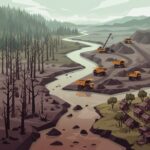Hosea Alfandi Irawan ( Environmental Activist)
Natural wealth is part of an inevitable gift, present as part of life on earth and as time goes by, humans continue to depend on the results of natural resources. Indonesia is one of the many countries blessed with natural wealth such as mines, forests, and seas, but until now all the wealth that Indonesia has has not succeeded in delivering it to a rich country or a developed country, instead natural wealth brings Indonesia to much greater challenges, conflicts, and rebellions.
For example, what happened in East Kalimantan, the Dayak indigenous people are still standing on the front lines against the expansion of coal mining concessions and what happened is the same in Papua, the clash of interests between large companies and mines and local residents continues to drain the wounds. All ultimately rests on one point that the wealth of natural resources does not always bring wealth itself and this even brings a curse. That is what Richard M. Auty said in his book entitled Sustaining Development in Mineral Economies: The Resource Curse Thesis, Auty explained that the wealth of natural resources is a factor in slow economic growth when compared to countries poor in natural resources (Auty, 1993)
This condition, which is now known as the “Resource Curse”, causes a country to stagnate and is unable to rely on economic independence and continues to rely on the power of natural resource exports rather than taxes. This curse is not a myth but a fact that occurs in parts of the world including Indonesia. Paul Collier argues that although rising commodity prices can increase economic growth in the short term, there is no guarantee that it will continue to run in the long term, in fact, natural resources that continue to be relied on will worsen the condition of political performance and governance (Winter, 2010).
One of the most obvious manifestations of this curse in Indonesia is the clean water crisis. In many resource-rich areas, access to drinking water is very low. A study from the Journal of Tropical Environmental Science states that more than 60% of wells, especially in the Bangka Belitung area, Central Bangka Regency, contain heavy metals such as lead and manganese, due to sedimentation and runoff of tin mining waste that has been going on for a long time and tin producers are in this area.
However, the problem is the wrong governance and weak government institutions both at the local and national levels and mining permits in Indonesia overlap with community water areas or sources. In many cases, water resources are not only affected by side effects, but are used as commodities. Reservoirs and ponds that should be water reserves for agriculture and the community are instead diverted to the needs of strategic industrial projects. Like what happened in East Java, the conflict in Wadas Village is a reflection of how the construction of dams and andesite mines sacrifices springs and agricultural land that are the source of life for residents.
This problem is further complicated by Indonesia’s failure to understand that water is a basic right, not just a technical infrastructure. The government often answers the water problem by building PDAM connections or community-based drinking water programs. However, it does not address the root of the problem. As noted by Collier and Hoeffler, the resource curse not only damages the economy and politics but also weakens the basic function of the state to provide public goods (Winter, 2010). Natural resources are taken for profit, so the function of the state changes from being a servant of the people to being a servant of capital.
One thing that is worth highlighting is the community moving like in Bangka, a community of mothers formed the People’s Clean Water Post which independently measures water quality and urges transparency of mining waste data. In West Sumatra, residents adopted a natural filtration system based on bamboo and charcoal to deal with river water polluted by gold mines. Movements like this show that public awareness is growing in the midst of a country that is not yet truly present.
Escaping the resource curse is not just about fixing the political system, but also about the moral courage to admit that we have not only failed to manage nature but have also harmed it. Wealth will not save us if the water is no longer drinkable.
Reference
Auty, R. M. (1993). Sustaining Development in Mineral Economies: The Resource Curse Thesis. Routledge.
Winter. (2010). The Political Economy of Natural Resources. The Johns Hopkins University Press, 77, 1105–1132.




